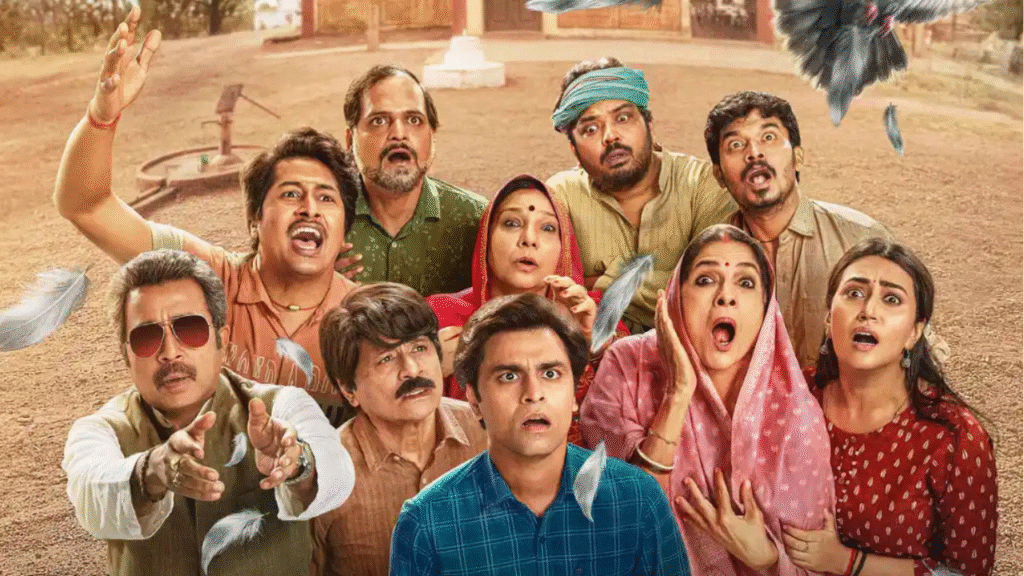Language: Hindi
Age Rating: U/A
Genre: Social Drama, Political Satire, Slice-of-Life
Streaming On: Prime Video
In this Panchayat Season 4 review, we delve into the evolving heart of Phulera, where politics takes centre stage and personal conflicts intertwine with public responsibilities. With TVF’s signature realism and earthy humour, the fourth chapter of this much-loved series dares to transition from relatable simplicity to a complex rural political landscape.
Though the tone may have shifted, the performances are reason enough to stay rooted.
Plot: Politics Invades Peaceful Phulera
Picking up right where Season 3 ended, Panchayat Season 4 revolves around the heated village elections, as Manju Devi and Kranti Devi lock horns for the coveted Pradhan seat. With political agendas, shifting loyalties, and social tensions on the rise, this season swaps emotional warmth for political strategy.
At the centre of it all is Abhishek Tripathi (Jitendra Kumar), the Panchayat Secretary who once sought government experience but now finds himself caught between ambition, duty, and moral fatigue. As village friendships get tested and new characters step in, Phulera no longer feels like the charmingly dysfunctional village—it feels like a miniature version of India’s democratic chaos.
Check Out: Panchayat Meets Gram Chikitsalay: Banrakas Visits Dr. Prabhat in a Hilarious Promo Crossover
Performances: Familiar Faces, Evolved Characters
Despite occasional stumbles in plot progression, the ensemble cast lifts the series to a higher plane:
- Neena Gupta as Manju Devi is undoubtedly the season’s soul. Once reluctant, she now takes charge with poise and power. Her transition from a symbolic head to an active, opinionated leader is refreshing and inspirational.
- Jitendra Kumar portrays Abhishek with layered restraint. While his character seems emotionally distant this time around, Kumar subtly expresses internal frustration—making his silence feel louder than dialogue.
- Faisal Malik (Prahlad) delivers another emotionally rich performance. Still coping with the grief of losing his son, his quiet presence and loyalty to his friends add poignant depth.
- Ashok Pathak as Binod surprises with standout moments—whether it’s an awkward dinner, emotional breakdown, or moral stand, Pathak captures the spotlight with sincerity.
- Raghubir Yadav, Chandan Roy, Saanvika, and Durgesh Kumar bring authenticity to their roles, each reflecting different shades of rural aspirations and frustrations.
Direction and Tone: From Humour to Hardcore Reality
Season 4, helmed by Deepak Kumar Mishra, leans more into drama than the series’ earlier comedic touch. It examines rural democracy and local governance without becoming preachy. However, the satirical undertone is subdued compared to earlier seasons. While the storytelling remains grounded, the emotional warmth feels somewhat diluted by the heavy focus on political tension.
Certain scenes — like a surprise cooker explosion or a rushed outburst from the Pradhan — break the tonal rhythm, but are salvaged by the underlying realism and strong performances.
Cinematography and Sound Design: Phulera Through a Grittier Lens
The cinematography continues to embrace natural lighting, handheld realism, and close-knit framing, which makes Phulera feel lived-in. From political rallies to quiet nighttime confessions, the camera lingers where it matters.
The background score subtly enhances tension without overpowering scenes. Folk-inspired tunes and ambient soundscapes remain signature elements that connect the viewer to the rural heartland.
Check Out: Panchayat Season 4 Teaser Review: Phulera’s Election Fever Ignites
Strengths and Shortcomings
What Works:
✔️ Neena Gupta’s powerful performance and character arc
✔️ Strong ensemble cast with emotionally resonant scenes
✔️ Realistic portrayal of local politics
✔️ Poignant moments from Faisal Malik and Ashok Pathak
Where It Stumbles:
❌ Some subplots feel forced or unnecessary
❌ Uneven pacing in the middle episodes
❌ Less emotional depth compared to earlier seasons
Cultural Relevance and Impact
Panchayat Season 4 evolves with its audience. It acknowledges the changing socio-political climate of rural India while questioning leadership, loyalty, and the meaning of public service. Though not as emotionally tender as the first two seasons, this chapter is a wake-up call about the challenges faced in grassroots governance and the human flaws that come with power.
Check Out: Panchayat Season 4 Announced: A Journey from Phulera to Fans’ Hearts Continues
Final Verdict: ⭐️⭐️⭐️⭐️½ (4.5/5 Stars)
Panchayat Season 4 might not offer the comfort of previous seasons, but it delivers something just as important—growth. With standout performances, especially by Neena Gupta and Faisal Malik, and a more politically relevant storyline, this season is a bold, thought-provoking addition to the TVF legacy.
Whether you’re here for nostalgia or social commentary, this season leaves you thinking long after the credits roll.
Should You Watch It?
Absolutely. It’s no longer just about village life—it’s about life’s many battles, fought quietly in the corners of forgotten India.
